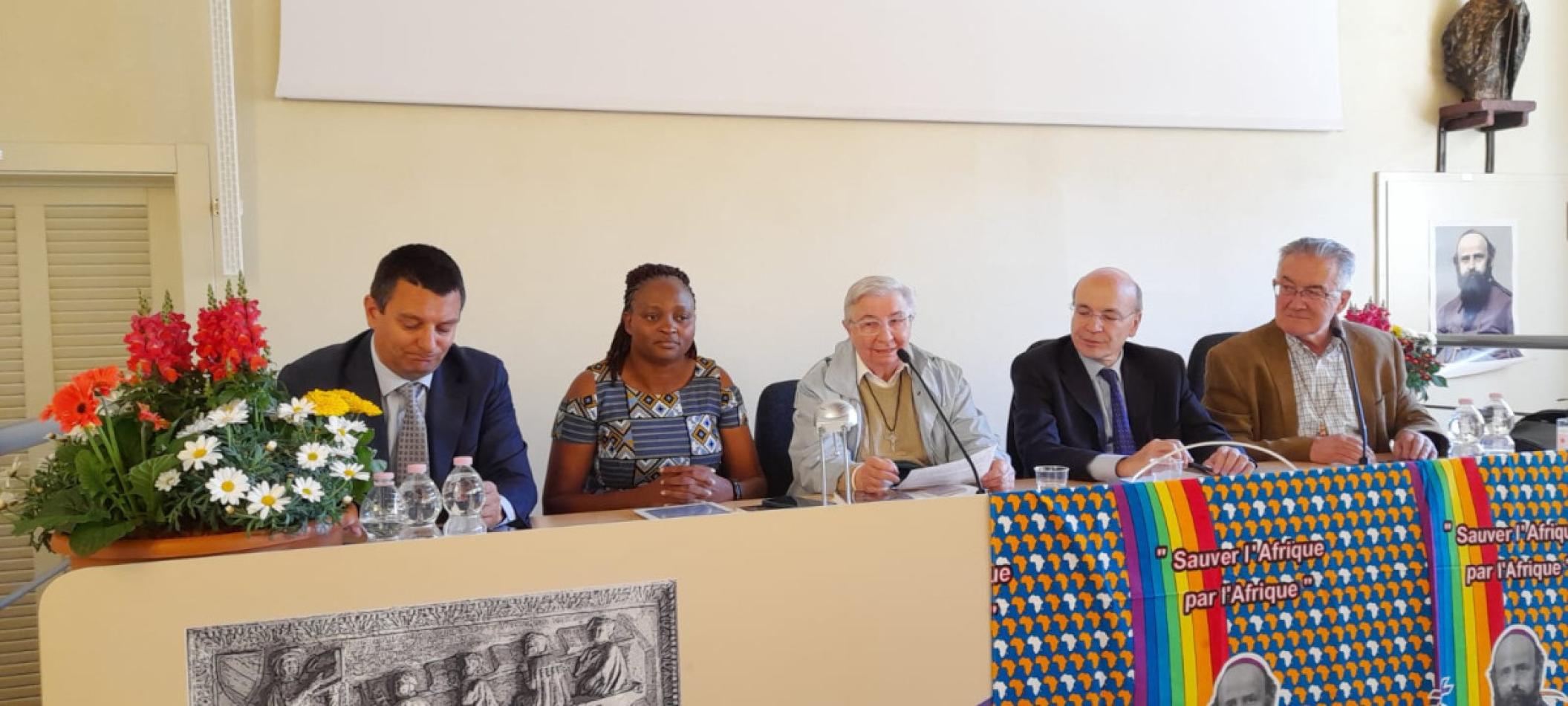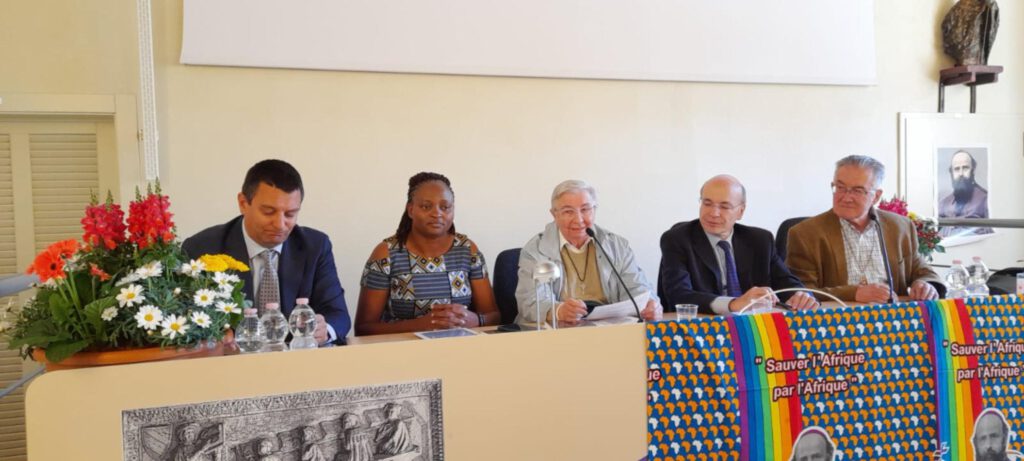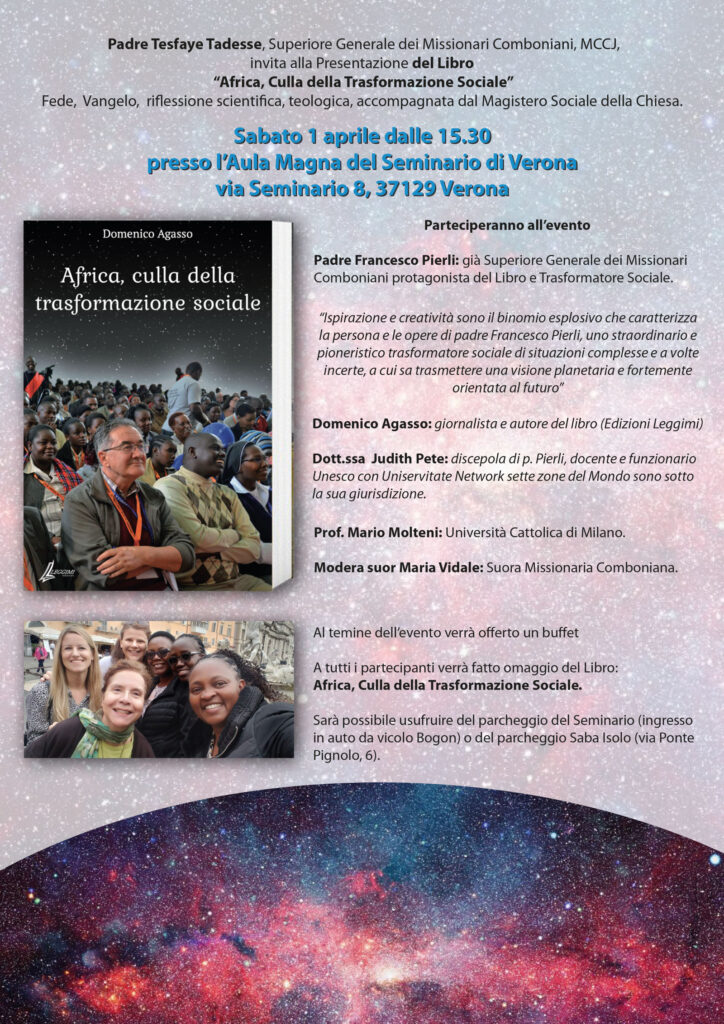The book “Africa, Cradle of Social Transformation” written by Domenico Agasso, which reconstructs the missionary journey and vision of Fr. Francesco Pierli [right in photo], was presented in Verona on Saturday, April 1. The volume traces the stages of Fr. Francesco’s life highlighting his vital experiences and the historical processes from which his research and praxis of social transformation developed.
What emerges is a profoundly Combonian journey, reflecting the ideas, values and style of St. Daniel Comboni’s Plan for the Regeneration of Africa with Africa. Continuity and discontinuity at the same time, as often emerges in Fr. Pierli’s own reflection. Discontinuity in that times have changed a great deal, with a quite different mentality and socio-economic structures. We thus encounter a thought that critically confronts the great social and cultural transformations of our time and operates a discernment in order to respond to the epochal challenges that arise according to God’s dream.
It can be understood then how from his origins in post-World War I Umbria, marked by strong tensions and demands for social justice, Fr. Pierli developed a particular sensitivity and interest in the social doctrine of the Church and the vocation to social and “political” responsibility of Christians. He lived the season of the Second Vatican Council and put it to good use, inspired by the vision of Gaudium et spes and Lumen gentium. He becomes involved with both the magisterium and the social praxis of the Church, and when, at the end of his term as Superior General of the Comboni Missionaries, he landed in Kenya, he founded the Institute of Social Ministry in Mission (now the Institute for Social Transformation) at Tangaza College (in the Catholic University of East Africa). It was 1994, a year full of events: that of the first synod for Africa, in which he participated as an expert; the first democratic elections in South Africa, sanctioning the transition after apartheid; but also the genocide in Rwanda, a predominantly Catholic country. The African Synod called on the Church to embrace the social mission of the church in response to the major challenges on the continent. The Institute founded by Fr. Pierli was the first response to that invitation: to form social ministers equal to such great challenges.
A living testimony of the impact of the Institute’s work came from Dr. Judith Pete, a former student of Fr. Pierli’s, who now teaches at the same university and is in charge of the UNESCO Universities in Africa program, which promotes the synergy between learning and service on the ground. In addition to recounting how her encounter with Fr. Pierli profoundly marked her life, she emphasized the importance of the pedagogy used in the Institute, which harmonizes theory and practice, professional preparation and attitude of service and integrity. Most importantly, he emphasized how the Institute for Social Transformation’s programs contribute to the formation of leaders dedicated to social transformation in Africa.
Prof. Mario Molteni, from the Catholic University of Milan, spoke, recounting the fruitful collaboration with Fr. Pierli and the Institute he founded. A collaboration that launched a master’s program for the training of social entrepreneurs, with a direct slant on start-ups with social impact. A program that was only possible to start because of Fr. Pierli’s courage and vision that made it possible to have an effective, open and creative counterpart in Africa. Today that program has spread to 20 African countries and in the next few years it will come to 5 more. It is not just an academic program in partnership with African universities, but a network of entrepreneurs and local business services for significant social impact, organized under an organization called E4Impact. Recently, this initiative was visited by President Mattarella during his official visit to Kenya, selected for its innovation and significance. Indeed, to overcome the socio-economic injustices and environmental unsustainability that are leading the planet toward catastrophic scenarios, we need a new model of development, as Pope Francis also often insists, for example in Laudato si‘ and with the Economy of Francis movement.
At the end of the event, Fr. Pierli was asked what has been the most difficult challenge of all these years. Without hesitation, he emphasized the difficulty of changing mindsets and attitudes, and power relations, that induce dependence rather than autonomy and interdependence in Africa. We still have not overcome the heavy colonial legacy. The journey for social transformation continues.
Original https://www.comboni.org/contenuti/115249
Here is the video of the book presentation with speeches by, among others, the author and Fr. Pierli himself.






